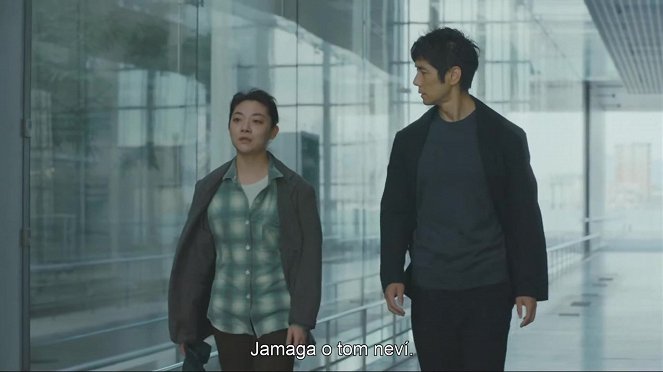Directed by:
Ryûsuke HamaguchiCinematography:
四宮秀俊Composer:
Eiko IshibashiCast:
Hidetoshi Nishijima, Tôko Miura, Masaki Okada, Reika Kirishima, Yoo-rim Park, Dae-Young Jin, Sonia Yuan, Perry Dizon, 安部聡子, 岩瀬亮, Toshiaki Inomata, Hiroko MatsudaVOD (2)
Plots(1)
Kafuku (Hidetoshi Nishijima), a stage actor and director, is happily married to Oto (Reika Kirishima), a screenwriter. However, when Oto suddenly passes away, she leaves behind a secret. Two years later, Kafuku, still unable to fully cope with the loss of his wife, receives an offer to direct a play at a theater festival in Hiroshima. There, he meets Misaki (Toko Miura), a reserved young woman assigned to be his chauffeur. As they spend time together, Kafuku confronts the mystery of his wife that quietly haunts him. (MUBI)
(more)Videos (8)
Reviews (8)
Anyone who has read anything by Haruki Murakami, even just a single book, will soon know how it is. You delve deep into art, sex, mental health, and feelings of abandonment – and you keep going back there almost constantly. Unfortunately, in the remaining time, there is a multilingual attempt at Russian classics, which are indeed related to the main character's many problems, but never justify why the sufficiently understandable quest for one's own paths takes three hours. Luckily, Hidetoshi Nishijima appears in the main role, and his intense and focused-every-second or even broken gaze carries the viewer from one car to another without feeling the passage of time.
()
I try to enrich myself with Asian cinema from time to time, so I decided to watch this film because I came across it often. It is a very slow, sensitive and thoughtful story. We have to wait longer to uncover the characters' troubled pasts, but you won't be disappointed, this is a story of escape, reconciliation, forgiveness and hope. The performances are very moving, and despite the very long running time, managed to keep my attention until the end.
()
"It’s Winter Sleep. I haven't seen you since 2014." "You know, I left early after you burned my film reels and wrote on them, ‘get out of town, you pompous monologist’." "And what part of ‘get out of town, you pompous monologist’ didn't you understand?" If a Saab had spent three hours going zoom around the unglamorous parts of Japan and we could just listen to it go from tunnel to tunnel, I'd be totally cool. Unfortunately, Hamaguchi and Oe have decided to create a monument to academic filmmaking, so for three hours we mostly listen to the theater-director-coping-with-loss-through-multilingual-elaboration-of-Chekhov's-play, and in between he introduces his mute driver to the mystery. Oh, the prizes this will win. With some of the endless monologues in the second half of the film, I had to remind myself how fantastic visual art can otherwise be in its ability to compress themes. Otherwise, it would always look like this. In the future, I'd love to have a wordless cut of the film. In the meantime, I invented a drinking game for you in the cinema. Don't worry, it's pretty cool. A sip of beer whenever a car enters or exits a tunnel and a shot whenever there's a shot of a record playing. Three hours later, it'll sink in nicely and you'll go home uplifted and in good spirits.
()
I've never read anything by Murakami, nor have I seen any film adaptation of his work to date, so Drive My Car was my first encounter with this world-famous writer. I was a bit put off from the screening by the three-hour running time, but it didn't matter that much in the end. Indeed, Hamaguchi's film (and fresh Oscar winner) has a gradual but not boring narrative pace. We follow the story of director Kafuku and his driver Misaki, two people who have little in common at first glance, yet are united by guilt and the trauma of having lost a loved one. In hindsight, it could be said that the basic structure of the film isn't really that original – we've seen coming to terms with the past and the struggle with its demons elsewhere – but Drive My Car has several moments and elements that bring it to life – the behind-the-scenes preparation of a play, the blending of several cultures and languages (thumbs up for the insertion of sign language), or even the opening credits almost halfway through the film. PS: Kafuku does bring to mind the name Kafka for a reason (see the author's 2002 novel).
()
No, I will not throw out superlatives and I will remain significantly reserved in my evaluation. Some directors successfully fit the adaptation of a several hundred-page novel into a two-hour blockbuster, but Hamaguchi managed to stretch the adaptation of a short story one-tenth of the size into three hours. It took me three tries to watch the film and that's not a good sign. I constantly felt like I was watching a snail on vacation, not in a rush to get anywhere. The film drags on and even though it introduces interesting motifs regarding the artistic creative process and the psychological aspect of coping with the departure of a loved one, it really doesn't deserve a higher rating. Overall impression: 55%. I am horrified at the thought of how long the adaptation of a thick tome of a 19th-century Russian classic would stretch in the hands of this director.
()



Ads